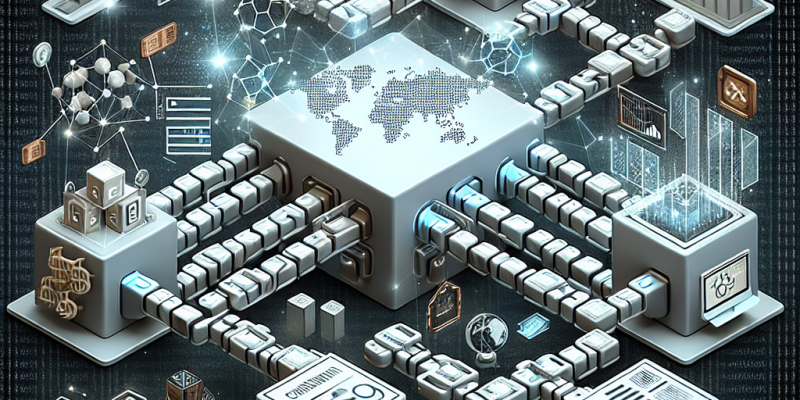From Supply Chains to Smart Contracts: The Versatile Applications of Blockchain Technology

From Supply Chains to Smart Contracts: The Versatile Applications of Blockchain Technology
Blockchain technology, often synonymous with cryptocurrencies like Bitcoin and Ethereum, has evolved significantly since its inception. Beyond its primary use in financial transactions, blockchain’s attributes of decentralization, transparency, and immutability have paved the way for its application across various sectors. The potential of blockchain stretches from supply chains to smart contracts, fundamentally reshaping how businesses operate and interact.
Understanding Blockchain Technology
At its core, blockchain is a distributed ledger technology (DLT) that allows multiple parties to maintain a synchronized database without the need for a central authority. Each transaction, or block, is securely linked to the previous one, forming a chain of blocks that are resistant to tampering or revision. This characteristic ensures that once data is recorded on the blockchain, it is nearly impossible to alter without the consensus of the network, thus enhancing trust among participants.
Blockchain in Supply Chain Management
One of the most prominent applications of blockchain technology is in supply chain management. Companies are increasingly adopting blockchain to enhance transparency and efficiency in their operations. Traditional supply chains often suffer from issues such as data silos and lack of visibility, leading to inefficiencies, fraud, and food safety concerns.
-
Transparency and Traceability: Blockchain allows for real-time tracking of products as they move through the supply chain. Each participant can access a single, immutable view of the product’s journey, ensuring authenticity and reducing the risks of counterfeiting. For instance, companies like Walmart have implemented blockchain to trace the origin of food products, enabling them to respond swiftly to safety recalls.
-
Cost Reduction: By eliminating intermediaries and enhancing direct communication among parties, blockchain can help reduce operational costs. Smart contracts—self-executing contracts with the terms of the agreement coded into the blockchain—automate transactions and verification processes, thereby reducing administrative overhead.
- Enhancing Collaboration: With a shared ledger, all participants in the supply chain—from manufacturers to retailers—can collaborate more effectively. This collaboration leads to better decision-making, inventory management, and demand forecasting.
Smart Contracts: Automating Processes
Smart contracts represent one of the most revolutionary implementations of blockchain technology. By enabling automated, self-executing agreements, smart contracts reduce the need for intermediaries in various transactions. These contracts are coded to automatically enforce and execute contractual obligations when predefined conditions are met.
-
Applications Across Industries: Smart contracts can be applied across various sectors, including finance, real estate, insurance, and legal services. In finance, they can automate the settlement of trades and compliance reporting, while in real estate, they streamline the buying and selling process by automatically transferring ownership upon payment.
-
Reducing Fraud: Since smart contracts operate on blockchain, they lower the risk of fraud significantly. Each transaction is recorded in a secure and transparent manner, making it difficult for any party to manipulate data without consensus from the network.
- Enhancing Efficiency: The automation of contractual processes not only speeds up transactions but also mitigates the risks of human error. This efficiency enhances overall business performance and customer satisfaction.
Beyond Supply Chains and Smart Contracts
While supply chains and smart contracts are two prominent applications, blockchain technology holds tremendous potential in various other domains:
-
Healthcare: Blockchain can securely store patient records while allowing for controlled access by authorized parties. This fosters interoperability between systems and enhances data security, thus improving patient care.
-
Energy Management: Blockchain can facilitate decentralized energy trading, where consumers can buy and sell excess energy peer-to-peer, resulting in a more sustainable and efficient energy ecosystem.
-
Voting Systems: Blockchain-based voting platforms can enhance transparency and trust in electoral processes. By ensuring that votes are securely recorded and easily verifiable, blockchain can address concerns related to election fraud.
- Digital Identity Verification: Blockchain can provide secure digital identity solutions, allowing individuals to maintain control of their personal information while sharing it selectively with service providers.
Challenges and Considerations
Despite the myriad potential applications, challenges such as scalability, regulatory uncertainty, and energy consumption remain hurdles to widespread blockchain adoption. Moreover, the integration with existing systems and the need for specialized knowledge can complicate implementation.
Conclusion
From transforming supply chains to enabling smart contracts, the versatile applications of blockchain technology are reshaping industries around the globe. While challenges persist, the continued evolution of blockchain will likely unlock new opportunities for efficiency, transparency, and trust in a rapidly digitizing world. As organizations begin to embrace this technology, it becomes increasingly clear that blockchain is not merely a fad but a foundational technology with the potential to reshape the way we conduct business.













